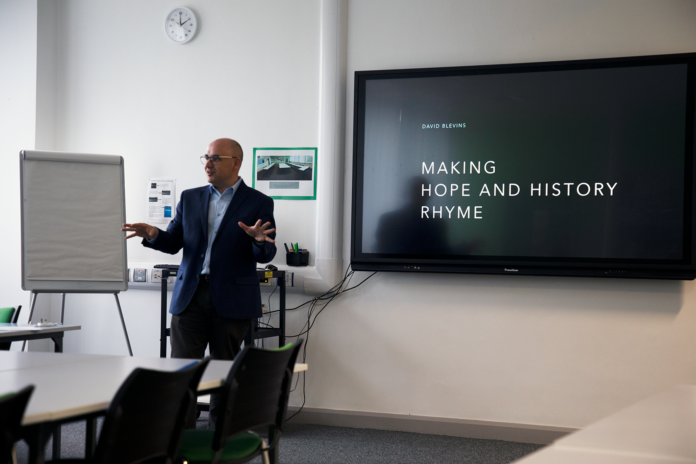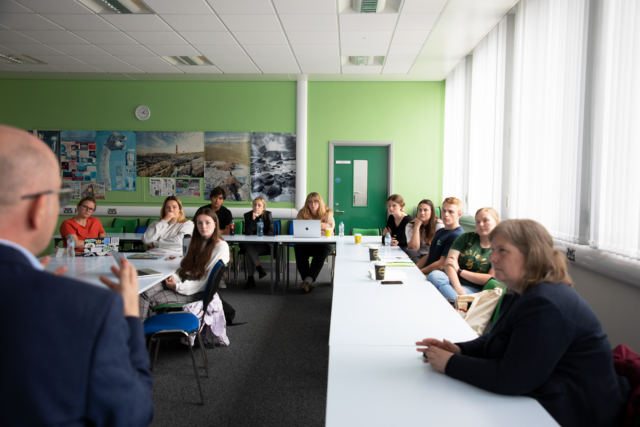
By Jenna Fitzgerald | Copy Editor
Bolstered by his conceptual framework of history, hope and rhyme, Dr. David Blevins spoke on June 17 about his experience as a journalist in Northern Ireland. Currently a senior Ireland correspondent for Sky News, he has been in the field for 32 years, living not only through the sectarian conflict of the Troubles but also through the groundbreaking success of the peace process.
For decades, Northern Ireland faced a history of conflict with a hope for peace, as the predominantly Catholic, pro-Irish nationalists fought against the primarily Protestant, pro-British unionists. Blevins said Northern Ireland showed it is possible for a people to overcome their history and achieve their hope.
“We thought the ceasefires were the pinnacle until the Good Friday Agreement,” Blevins said. “We thought the agreement was the pinnacle until British unionists and Irish republicans agreed to share power in government. Our politics became less partisan. If you hear nothing else I say today, hear those words, because my goodness does the world need to hear them. Our politics became less partisan.”
In fact, Blevins said numerous British prime ministers, including Winston Churchill, Harold Wilson and Margaret Thatcher, all said “there would never be an end to the conflict in Ireland” — proof that peace can reign over conflict even if the path appears difficult or impossible.
“I want you to remember that when people tell you that there will never be an end to racial tensions, to Islamic terrorism, to home-grown terrorism,” Blevins said. “Senator George Mitchell — the man who brokered the Good Friday Agreement, a man to whom we will always be grateful — said this: ‘I believe there’s no such thing as a conflict that can’t be ended. They’re created and sustained by human beings. They can be ended by human beings. No matter how ancient the conflict, no matter how hateful, no matter how hurtful, peace can prevail.’”
However, Blevins said that in order to make history and hope rhyme, the people of Northern Ireland had to take action and be professional.
“The breakthrough came when people finally realized that you can play to your own audience forever, or you can sit down like statesmen and women and have adult conversations,” Blevins said. “Playground politics have been killing us in Northern Ireland, literally. So we found another way, a better way, and we discovered in the process that talking to your enemy is not the same thing as appeasing your enemy. It’s always better to learn from an argument than to win one. And I think what we learned is that the greater good — peace — did not require there to be a winner and a loser.”

Schertz senior Kenzie Campbell said she sees the peace process and its role in solving the Troubles as an example for the United States, which is currently in the midst of a deep political divide between Democrats and Republicans. She said this model encourages healthy conversations instead of extremist sound bites.
“We’re not making progress,” Campbell said. “We just keep fighting with each other. So I think we could definitely take that advice and bring it back with us and try to resolve issues and treat each other like human beings and become less partisan … I feel like we’ve all been talking about it for too long, and nobody’s done anything. I think if people really tried and let their egos slide, we would get things done and make progress.”
In fact, Blevins said healthy conversations can lead not only to mutual understanding but also to fruitful friendship.
“The firebrand unionist, the Rev. Ian Paisley, and the former IRA commander, Martin McGuinness, not only shared power,” Blevins said. “They became very good friends and were pictured laughing together so often they were nicknamed ‘the chuckle brothers.’ What united those ancient enemies? They spent long enough in one another’s company to finally realize that the other might not be a monster after all.”
According to Blevins, journalism played a vital role in facilitating the rhyme of history and hope, as journalists ensured every voice was heard, read between the lines and found some space for good news. El Campo junior Haley Burrow said she hopes to explore the multifaceted field of journalism in pursuit of these goals.
“My hope as a future journalist is to pursue the truth from a different angle,” Burrow said. “I feel like a lot of journalism, especially straight news stories, I feel like they’re all told very similarly. One thing that I hope audiences see is it’s not just, ‘Here’s exactly what happened. Here’s the only thing that happened.’ There’s more than one side to things.”
Blevins said the key to finding unity is interacting with those who are different and accepting them.
“In a world of full stops, we need more commas,” Blevins said. “We need more opportunities to pause, to sit down with a cup of coffee and chat to someone who comes from a completely different perspective … There’s a very real sense that ‘the other’ still exists, but I think it’s a diminishing number of people who think like that. And I suppose the more it diminishes, the more desperate they become, and therefore their voices seem very loud. But I would be hopeful that we will get to a day where we stop thinking orange and green and realize there are many colors in the rainbow.”





